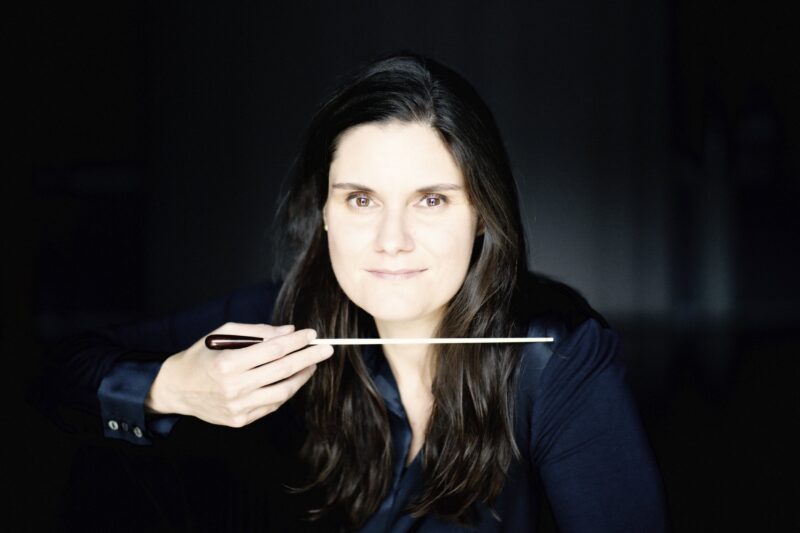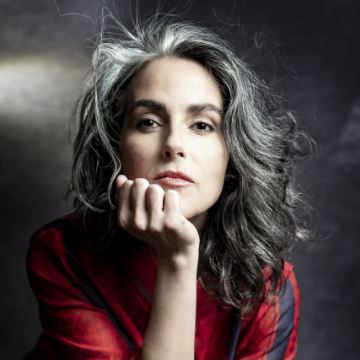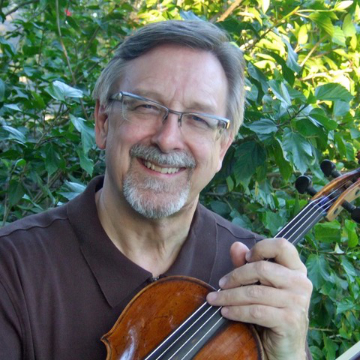
Delayana Lazarova conductor (credit: Marco Borggreve)
February 8, 2025
“Courageous”
The Church of St. John the Divine
Houston, Texas – USA
ROCO. Delyana Lazarova, conductor; Clarice Assad, performer; Lara Downes, piano soloist; Houston Youth Symphony, guest artists.
Emilie MAYER: Overture No. 2 in D major (1850 or earlier)
Clarice ASSAD: The Evolution of AI (2023) (Texas premiere)
Clarice ASSAD: Total Eclipse (2024) (world premiere)
Ludwig van BEETHOVEN: Symphony No. 7 in A major, Op. 92 (1811-12)
Lawrence Wheeler | 10 FEB 2025
ROCO, a 40-piece chamber orchestra in Houston, continued their Season 20 with two premieres, a side-by-side performance with a youth orchestra, and Beethoven’s Seventh Symphony. Titled “Courageous” (after the third letter of ROCO), conductor Delyana Lazarova led this concert at The Church of St. John the Divine in Houston on February 8th. The results ranged from interesting to extraordinary.
The program began with members of the Houston Youth Symphony sharing stands with ROCO musicians. Sitting on the outside and given solo wind parts, the HYS musicians did an admirable job performing Overture No. 2 by Emilie Mayer (1812-1883). One of 15 overtures composed by “the Female Beethoven,” the work is well constructed, having a nice contrast between rhythmic and lyrical themes. Given the time period in which she lived, Mayer’s choice to pursue composition as a woman was courageous. It was good to be introduced to this neglected composer. Lazarova’s conducting was energetic, with clearly indicated beats.
Brazilian-American composer Clarice Assad has accumulated an impressive list of compositions, many of which have been recorded. Receiving its Texas premiere, The Evolution of AI is about an artificial intelligence robot, or cyborg, that is being rebooted to life. An example of performance art, Assad wore a silver and black costume and played the cyborg character. It goes through the training about what music is—specifically, what classical orchestral music is. Beginning with “reboot,” Assad used a Genki wave ring hooked up to a computer to create various electronic sounds based on hand motions.

Clarice Assad (courtesy of ROCO)
The piece is supposed to begin with an Electro-Organic A-frame drum, but that was unexpectedly broken, making it necessary to omit the first six bars. Concertmaster Scott St. John indicated beats with his bow while Lazarova joined the first violin section. In “Data Collection,” the cyborg indicated random acoustic instrument sounds by first waving and gesturing, then going into the ensemble to “create” longer samples. In “Machine Learning,” the cyborg absorbs and adapts Western compositions. It then finds and looks quizzically at a conductor’s baton and hands it to Lazarova, who conducts “Creation.” In this section, we hear fragments of several well-known pieces until the machine experiences an unexpected glitch, leaving its fate uncertain.
Assad’s performance was highly effective, although it may be proprietary. The piece itself is a novel mix of traditional and technological sounds. Given the current concerns about AI and its future use, this piece serves as a timely metaphor, leading to the question—what’s a Meta for?
Commissioned by ROCO, the performance of Clarice Assad’s piano concerto Total Eclipse was a world premiere. Written for pianist Lara Downes, the idea for the piece originated with a phone call between composer and pianist on the day of a solar eclipse. They had spoken of personal experiences that year that ranged from joy to sadness or light to darkness. The solar eclipse became a metaphor for exploring light and darkness, shade and color in music and in life.

Lara Downes (courtesy of ROCO)
Joining relationships separated by time, Assad musically explores humanity’s ancient and modern viewings of a solar eclipse. Utilizing some non-traditional effects such as playing inside the piano, she created a wide range of colors and feelings, all realized by Downes’ superb execution and stage presence. The three sections, titled “RA,” “Cosmic Dust,” and “Totality,” sustained interest through a variety of musical styles and meters. Coupled with well-played instrumental solos, the piece seemed shorter than its 19 minutes. Of particular note were timpanist Craig Hauschildt and percussionist Christina Carroll. Lazarova navigated the variegated elements with assurance.
Beethoven’s Symphony No. 7 is one of the greatest symphonies ever written, with its second movement, the “Allegretto,” a contender for the greatest movement ever. What makes this symphony so great? Called “the apotheosis of the dance” by Wagner, Beethoven uses rhythm and harmony to create a wide range of emotions that reach out and grab us more than 200 years later. He was experiencing irreversible deafness at the time, and Europe was in the throes of war. He could have retreated into himself, but instead courageously shook his fist (or foot) at fate and created ever greater music.
Such a monumental work, one of humanity’s greatest creations, warrants as much care and attention as humanly possible to realize its full grandeur. With the caveat that perfection in art does not exist, this evening was the finest live performance of Beethoven’s Seventh I have ever heard. What was so great about it? To begin, the ensemble that is ROCO, a collection of superb musicians totally committed to playing their best, such as this night. But even a Stradivarius violin requires a player of consummate skill to elicit all the colors and powers of expression within. An orchestra is the ultimate instrument.
Enter Delyana Lazarova, my new favorite young conductor. What makes this conductor so great? Intelligence, integrity, musical honesty, communication, and consummate good taste. There are two screens on either side at ROCO concerts. Some camera shots showed the conductor’s face, a point of view not normally seen from the audience. It was amazing to see how Delyana could communicate changes of character, phrase by phrase and instrument by instrument—not just by her polished stick technique, but her facial expressions. Always spot on, it showed an intimate understanding of the music and the musicians in front of her. They, in turn, produced spectacular results. It was the Miracle on Westheimer.
It would be impossible to list all the fine details or wind solos of this performance as it would be a roll call. Tempos were ideal, balances were near perfect (Delyana had the trumpets drop back on their high A), ensemble was spot on, and the emotional content was there throughout. (Yes, I shed a few tears in the “Allegretto.”) I predict that someday, hopefully not too far off, this conductor will be hired as music director of a major orchestra. She’s the real deal. ■
EXTERNAL LINKS:
- ROCO: roco.org
- Delyana Lazarova: delyanalazarova.com
- Clarice Assad: clariceassad.com
- Lara Downes: laradownes.com

Lawrence Wheeler was a music professor for 44 years. He has served as principal viola with the Pittsburgh Symphony, Minnesota Orchestra, and Houston Grand Opera Orchestra, and guest principal with the Dallas and Houston symphonies. He has given recitals in London, New York, Reykjavik, Mexico City and Houston, and performed with the Tokyo, Pro Arte and St. Lawrence string quartets and the Mirecourt Trio. His concert reviews have been published online on The Classical Review and Slipped Disc

Leave A Reply